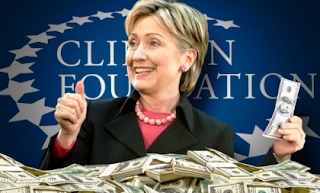The Clinton foundation is and has been, the Clintons' greatest political and financial tool for personal advancement, and though the family collects no actual salary from the public charity, it helped build their robust political donor network, gain and maintain access to world leaders, and, most importantly, acquire paid speaking engagements—one of their greatest sources of personal revenue.
Though Hillary Clinton cut ties with the foundation in 2008 to become Secretary of State, Bill Clinton maintained his leading role on the charity's board, ensuring that his wife maintained a financial and political interest, albeit indirectly, in the foundation. In and of itself, such a setup is a prima facie example of a conflict of interest.
Back in April of 2014, the Washington Post reported that two months after Secretary Clinton had helped Boeing secure a US$ 3.7 billion deal to sell aircraft to the Russian government, the aeronautics giant donated US$ 900,000 to the Clinton Foundation.
A year later, in April 2015, The New York Times reported that after the Clinton State Department approved a deal which gave Russia control of the world’s largest production company, Uranium One, the company’s chairman, by way of his family foundation, donated US$ 2.35 million to the Clinton Foundation, and paid Bill Clinton US$ 500,000 in speaking fees.
Then in July of that year, the Wall Street Journal reported that after Secretary Clinton helped UBS avoid legal trouble with the Internal Revenue Service, the Swiss bank’s involvement with the Clinton Foundation and the Clintons significantly increased. It increased its donations to the charity, and partnered with it on a multi-million dollar project, and it became Bill Clinton’s "biggest single corporate source of speech income disclosed since he left the White House."
An International Business Times investigation from May of this year, found that foreign nations that donated to the foundation received increases in weapons sales from the State Department, at higher rates than non-donor nations, and defense contractors that donated—or paid Bill Clinton for speeches—received deals authorized by Clinton and the department. From the report:
Though Hillary Clinton cut ties with the foundation in 2008 to become Secretary of State, Bill Clinton maintained his leading role on the charity's board, ensuring that his wife maintained a financial and political interest, albeit indirectly, in the foundation. In and of itself, such a setup is a prima facie example of a conflict of interest.
Back in April of 2014, the Washington Post reported that two months after Secretary Clinton had helped Boeing secure a US$ 3.7 billion deal to sell aircraft to the Russian government, the aeronautics giant donated US$ 900,000 to the Clinton Foundation.
A year later, in April 2015, The New York Times reported that after the Clinton State Department approved a deal which gave Russia control of the world’s largest production company, Uranium One, the company’s chairman, by way of his family foundation, donated US$ 2.35 million to the Clinton Foundation, and paid Bill Clinton US$ 500,000 in speaking fees.
Then in July of that year, the Wall Street Journal reported that after Secretary Clinton helped UBS avoid legal trouble with the Internal Revenue Service, the Swiss bank’s involvement with the Clinton Foundation and the Clintons significantly increased. It increased its donations to the charity, and partnered with it on a multi-million dollar project, and it became Bill Clinton’s "biggest single corporate source of speech income disclosed since he left the White House."
An International Business Times investigation from May of this year, found that foreign nations that donated to the foundation received increases in weapons sales from the State Department, at higher rates than non-donor nations, and defense contractors that donated—or paid Bill Clinton for speeches—received deals authorized by Clinton and the department. From the report:
"Under Clinton’s leadership, the State Department approved $165 billion worth of commercial arms sales to 20 nations whose governments have given money to the Clinton Foundation, according to an IBTimes analysis of State Department and foundation data. That figure — derived from the three full fiscal years of Clinton’s term as Secretary of State (from October 2010 to September 2012) — represented nearly double the value of American arms sales made to the those countries and approved by the State Department during the same period of President George W. Bush’s second term.(From the articles of Lee Fang of The Intercept and Walker Bragman of Paste Magazine.)
The Clinton-led State Department also authorized US$ 151 billion of separate Pentagon-brokered deals for 16 of the countries that donated to the Clinton Foundation, resulting in a 143 percent increase in completed sales to those nations over the same time frame during the Bush administration. These extra sales were part of a broad increase in American military exports that accompanied Obama’s arrival in the White House. The 143 percent increase in U.S. arms sales to Clinton Foundation donors compares to an 80 percent increase in such sales to all countries over the same time period.
American defense contractors also donated to the Clinton Foundation while Hillary Clinton was secretary of state and in some cases made personal payments to Bill Clinton for speaking engagements. Such firms and their subsidiaries were listed as contractors in $163 billion worth of Pentagon-negotiated deals that were authorized by the Clinton State Department between 2009 and 2012."

